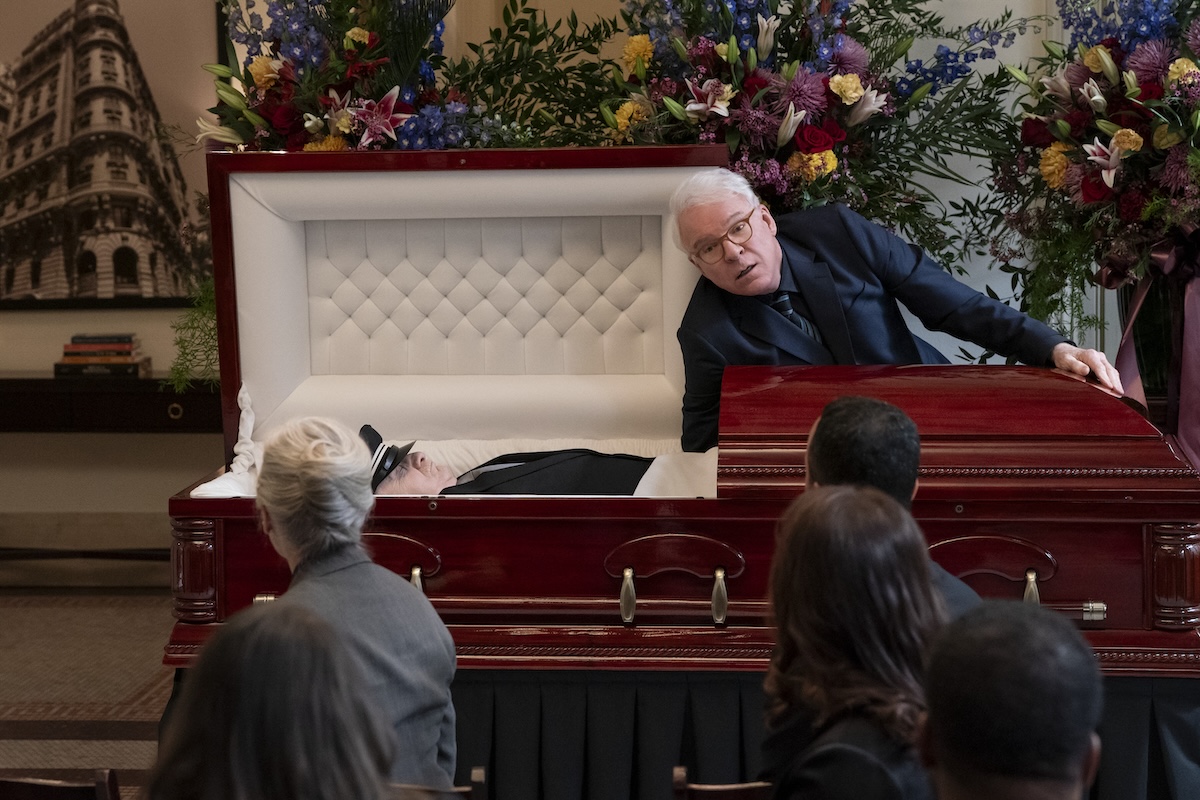There’s no shortage of small joys in “Only Murders in the Building” Season 5, the latest edition of Steve Martin and John Hoffman’s light comic-mystery. Dianne Wiest, as the principal victim’s mourning widow Lorraine, shouts “cuckoo chick” three times as if she’s the bird herself. Judy Hoffman, as the Arconia’s perennially disapproving neighbor Uma Heller, contorts her judgmental sneer with such pliable power that it’s as if her lips shape her opinions, rather than the other way around. Renée Zellweger — one of three two-time Oscar winners to guest-star in Season 5, along with Wiest and Christoph Waltz — furiously blinks before chiding, “Oh, isn’t this an assaulting amount of everything,” upon entering the ostentatious home of the ostentatious Oliver Putnam (Martin Short).
Each of these delightful details really has to be seen and/or heard to fully appreciate their delivery, but in the broader sense, the existence of delicious acting and dry wit in “Only Murders in the Building” should be as expected as the latest murder in the building. Such is the bar set and regularly met by Hulu‘s hit series: that so many A-list actors will not only appear, but be given worthy material to chew on; that there will be another mystery, as twisty and engaging as you want it to be; that Oliver, Charles (Martin), and Mabel (Selena Gomez) will work it, legal repercussions be damned; and that their podcast will be pieced together right in front of our eyes, fit to a convenient pop culture motif, be it Broadway or Hollywood, high art or the new mob.
“Only Murders in the Building” would not be the hit it’s become without these recurring staples, and it’s a credit to Hoffman, Martin, and the rest of the team that such hard-won artistry can be so easily appreciated. But there’s another key to the series’ ascendancy that lends additional credit to its creators: time.
When Season 5 wraps at the end of October, “Only Murders in the Building” will have released 50 episodes in four years. New seasons have hit like clockwork, landing sometime between late June and early September every year, and each one has earned markedly similar acclaim: As of Monday, Metacritic scores for each season are within three points of each other across five seasons, and the series has won seven Emmys while racking up 56 Emmy nominations. It could win more on Sunday!
Such success, year after year, makes “Only Murders” an anomaly in a streaming TV era known for exorbitant gaps between seasons. “House of the Dragon” banks on taking two years between seasons. “Severance” didn’t clock in at Lumen Industries for three years, which was just a bit longer than “Wednesday” cut classes at Nevermore Academy and “Peacemaker” abandoned America. The “Stranger Things” kids could’ve graduated junior high and high school in the time it took for 42 episodes to roll out, and “Euphoria,” well, Rue Bennett may never graduate, but there’s a reunion planned for their four-year anniversary.
Despite what these programmers would have you believe, there’s a huge benefit to actually seeing your favorite characters on a fixed annual schedule — growing alongside them (or not), sharing cultural touchstones (or not), and staying connected in a way that doesn’t require homework in between encounters (or, you know, it still does). As James Poniewozik wrote in a New York Times essay on this issue, the audience’s relationship to shows it consistently spends time with is more intimate, whereas TV’s trending model take times away from the audience’s relationship with characters.
But continued closeness creates loyalty among subscribers and awards voters alike. It’s a vital advantage to television as a medium — one of the ways it distinguishes itself from movies and theater. “The Pitt” producer John Wells knows as much, which is why his medical drama is primed to return exactly 364 days after its first season dropped.
“You go to a movie for two hours, but with a show, you are watching in your home week after week and year after year,” Wells told Vulture last year. “You’re building familiarity with the characters, so getting into a pattern is very helpful. It’s always better to have shows return as quickly season to season as you can. Regularity keeps people coming back.”
Of course, it’s not just regularity — it’s regularity paired with performance. In that same article, author Joe Adalian points out that one of the prime reasons certain TV series take so long in between seasons is because they’re designed differently than typical television: Mainly, they have way more special effects. “House of the Dragon” has dragons to design, “Stranger Things” is busy rendering demagorgons, and “Euphoria” has to account for Sam Levinson’s ego.

But quality spectacle isn’t a replacement for quality time, and shows like “Only Murders in the Building” know it. After spending a little too much time with celebrities in Season 4, Season 5 renews its focus on the core cast. Charles goes through a lonely late-life crisis, after season after season of severed relationships — his ex-girlfriend Jan (Amy Ryan), de facto daughter Lucy (Zoe Colletti), and body-double/best-friend Sazz (Jane Lynch). Oliver suddenly recognizes his rampant narcissism may be an issue worth addressing, after four seasons of pushing his own accomplishments and priorities to the forefront. And Mabel’s struggles to connect with friends her own age are brought to the forefront when a childhood friend (Beanie Feldstein) reemerges out of the blue.
Would any of that matter if we couldn’t remember why it matters to them? Would we still be able to share in their struggle and (hopeful) catharsis? Would we still be invested at all? And without those endearing connections to our core trio, would any of their antics still be as funny, five seasons in?
Astute readers may have noticed that all the shows cited above for excessive hiatuses share a similar designation: They’re all dramas. Dramas are more likely to require lengthy post-production work (like VFX), just as they’re more likely to attract film auteurs (who don’t know how to make television at its appropriate pace) and streaming companies (that see serious fare as a more reliable means to retain subscribers).
Comedies can take a while to make, too, but lately, they’ve been much more attuned to audience demand than their lengthier TV companions. Of the eight comedies nominated for Best Comedy Series at the 2025 Emmys, all eight were released at a consistent annual pace or plan to be (though we’ll see how long it takes for “The Studio” Season 2 to drop). The drama nominees, meanwhile, only feature four such shows (shout-out to the real ones, “Slow Horses,” “The Diplomat,” “Paradise,” and “The Pitt”). That’s honestly more than I expected (and could help explain why “Squid Game” and “The Handmaid’s Tale” were pushed out), but it also sets up an intriguing X-factor in the race for Best Drama Series.
Many prognosticators have argued the field has narrowed to “Severance” vs. “The Pitt”: a heady auteur-driven mystery-thriller that’s released 20 episodes in three years vs. a throwback medical drama made by TV veterans who pumped out 15 episodes in one season. It’s too reductive to call this a battle between the head and the heart, since both series are smart and moving with ardent fans who will attest to both. But it’s also easy to see how one show might prefer to be respected, and while the other is made to be loved. It’s as evident in how their campaigns are framed as it is in how their series are designed: the time spent crafting a story vs. the time spent sharing that story with their audience.
“Only Murders” is also made to be loved. And even after five seasons — or because of those five cumulative seasons — that’s still easy to do.
“Only Murders in the Building” Season 5 premieres Tuesday, September 9 on Hulu with three episodes. New episodes will be released weekly through the finale on October 28.



